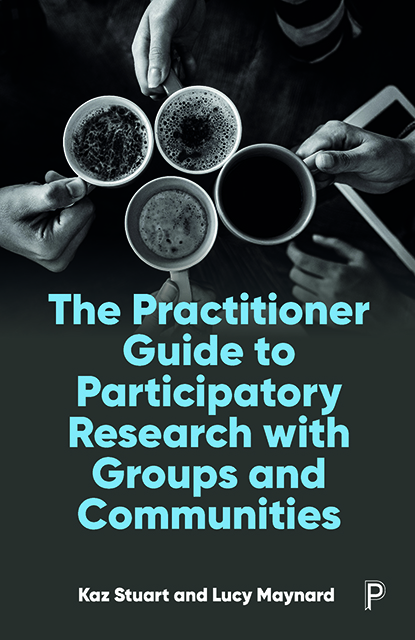Book contents
- Frontmatter
- Contents
- List of Figures and Tables
- Glossary
- About the Authors
- Acknowledgements
- Foreword
- Foreword
- Introduction
- 1 Just What is Participatory Research?
- 2 How do We Begin to Plan Our Participatory Research Project?
- 3 What Do We Want to Explore and Why?
- 4 What Ideas are the Foundations of Our Research?
- 5 How Will We go About Exploring Our Questions?
- 6 Who Can Get Involved to Explore Our Questions?
- 7 How Shall We Collect Our Data?
- 8 What Do We Do With Our Data?
- 9 How Do We Get Our Messages Out There?
- 10 How Do We Keep Everyone Safe?
- 11 Doing and Reviewing Participatory Research
- Conclusion
- References
- Index
1 - Just What is Participatory Research?
Published online by Cambridge University Press: 21 June 2023
- Frontmatter
- Contents
- List of Figures and Tables
- Glossary
- About the Authors
- Acknowledgements
- Foreword
- Foreword
- Introduction
- 1 Just What is Participatory Research?
- 2 How do We Begin to Plan Our Participatory Research Project?
- 3 What Do We Want to Explore and Why?
- 4 What Ideas are the Foundations of Our Research?
- 5 How Will We go About Exploring Our Questions?
- 6 Who Can Get Involved to Explore Our Questions?
- 7 How Shall We Collect Our Data?
- 8 What Do We Do With Our Data?
- 9 How Do We Get Our Messages Out There?
- 10 How Do We Keep Everyone Safe?
- 11 Doing and Reviewing Participatory Research
- Conclusion
- References
- Index
Summary
Chapter overview
This chapter will introduce you to what research is generally, before specifically introducing participatory research to you. The benefits and challenges of participatory research will be outlined with reference to social justice. This chapter will help you to understand and in turn communicate to others why this type of research is so important.
Just what is research?
We have a very straightforward and broad definition of research – it is any activity that is focused on exploring a question or questions. There are many different questions we could ask about the world and equally many different types of research to explore these questions. All are useful but choosing the right one can sometimes make research seem very complicated.
As research is about exploring questions, all research will have a research purpose – something it is trying to achieve – and one or more research questions. Exploring these questions will help you achieve your purpose. All research has a research approach – a way of doing something – as well as an output and end product. In this respect, it is a little like making a cup of tea. At the beginning you intend to make a drink (your purpose), you consider what type of tea you want (questions), you have a set of ingredients, decisions and instructions (your approach) and you end up with a nice cup of tea to drink (your research output). Just as there are many types of tea and ways to make tea, so there are different types of research and ways to go about it. No single tea or way of making tea is right or wrong, but you might serve the wrong type of tea to the wrong people – with milk when they normally take it without! In a similar way, no single type of research is ‘wrong’, but you could use the ‘wrong’ type of research for the questions you are trying to answer.
And what about the participants? You might think that all research needs to involve people, but in its widest sense, research can also include objects, animals, microbes and existing data, and so may not have any participants at all.
- Type
- Chapter
- Information
- Publisher: Bristol University PressPrint publication year: 2022



